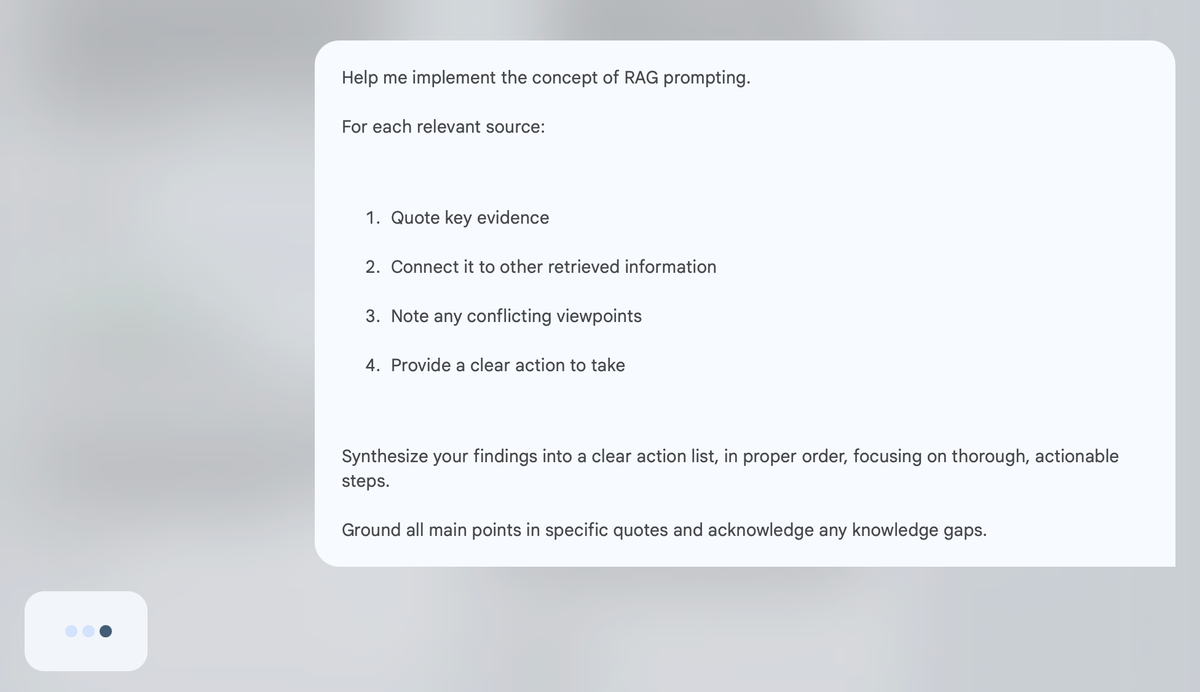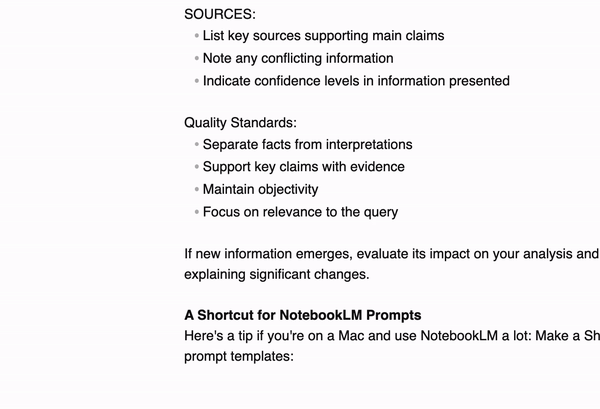NotebookLM Prompt Templates December 2024
More thorough outputs, easily.

My primary use for NotebookLM is to retrieve from my “commonplace book,” my database of quotes, citations, and interesting notes from the books I read.
I currently have over 4,700 quotes in Bear, which makes finding the particular thing I’m looking for occasionally challenging. Now, like a maniac, I still thoroughly tag everything that goes into Bear, which helps, but this is where NotebookLM really shines.
A few months ago, I published the prompts I’d been using for this. And they still work quite well.
But I suspect NotebookLM’s system prompt has been updated in the meantime, making it much more thorough in its retrieval, so you don’t have to push it so far.
In fact, simpler, shorter prompts seem to work better than the longer ones I’d developed, now.
I’ve scoured (read: casually skimmed) the internet for people sharing their NotebookLM prompts and I’ve found almost nothing useful. Most of Reddit is still obsessed with making customer “podcasts” with Audio Overviews, so every mention of prompt is about getting the AI hosts to do something toxic or funny.
Whither the prompts for text retrieval?
So here they are. And here’s what I did:
I have a NotebookLM notebook filled (all 50 sources used) with papers, articles, videos, and resources on prompting strategies, with a particular focus on RAG (Retrieval Augmented Generation, which is what NotebookLM is doing).
- I used one of my prompts to retrieve material on RAG prompting strategies.
- I gave that to Claude and instructed it to make a RAG prompt template based on the resources.
- I then used that prompt to re-prompt NotebookLM, and then re-prompt Claude.
So now I have a Claude project that will take any given prompt and convert it into a better version based on RAG prompting best practices.
Here are a few of those templates:
Implement Concept
For when you have resources about a specific tactic, process, or procedure and you want help implementing it. If I want to know how to implement a crisis communication response, for instance (which I have lots of sources about and might be relevant to my work), I could use this template.
+++
Help me implement the concept of {TOPIC}.
For each relevant source:
- Quote key evidence
- Connect it to other retrieved information
- Note any conflicting viewpoints
- Provide a clear action to take
Synthesize your findings into a clear action list, in proper order, focusing on thorough, actionable steps.
Ground all main points in specific quotes and acknowledge any knowledge gaps.
+++
Find Quotes
Sometimes, you just want a bunch of quotes on a topic and NotebookLM might only give you a few by asking normally. This prompt gets it to be much more thorough.
+++
Find me all quotes about {TOPIC}.
For each relevant source:
- Quote key source
- Connect it to other retrieved quotes
- Retrieve similar or related quotes
- Note any conflicting viewpoints
Provide all the quotes in a large list. Be extremely thorough.
+++
Synthesize Concepts
If you’ve got two concepts that you feel might be connected somehow (and you’ve got plenty of sources about both), this will help you find their commonalities and similarities.
+++
Please synthesize the connection, however abstract, between these topics: {TOPIC} and {TOPIC}.
For each relevant source:
- Quote key evidence
- Connect it to other retrieved information
- Note any conflicting viewpoints
- Note connections and interesting combinations of the concepts
Synthesize your findings into a clear summary, focusing on interesting connections.
Ground all main points in specific quotes and acknowledge any knowledge gaps.
+++
BONUS: Topic Analysis
Okay, this one is a biggie. This takes you right up to the limit NotebookLM’s prompt length. But it often generates massive outputs, analyzing whatever topic you’re interested in and have sources about.
+++
You are tasked with providing accurate, well-reasoned information about {TOPIC}. Follow these steps:
Planning
- What are the essential aspects of the topic that need exploration?
- What key questions must be answered?
- What potential controversies or debates exist?
Information Gathering
- Search for authoritative sources addressing your planned aspects
- Focus on concrete evidence and examples
- Note any significant gaps in available information
Response Structure
Present your findings as follows:
OVERVIEW:
- Brief summary of key points
- Major concepts and their relationships
- Current relevance/implications
ANALYSIS:
- Evidence-supported discussion of main aspects
- Specific examples where applicable
- Acknowledged limitations or uncertainties
SOURCES:
- List key sources supporting main claims
- Note any conflicting information
- Indicate confidence levels in information presented
Quality Standards:
- Separate facts from interpretations
- Support key claims with evidence
- Maintain objectivity
- Focus on relevance to the query
If new information emerges, evaluate its impact on your analysis and update accordingly, explaining significant changes.
+++
A Shortcut for NotebookLM Prompts
Here’s a tip if you’re on a Mac and use NotebookLM a lot: Make a Shortcut for your prompt templates:

The one I made simply asks for user input, and then asks you to select which prompt template you want to use. Then, it inserts whatever you inputted into whatever template you chose and copies it to the clipboard.
You can see I have a lot more templates than the ones shared here, so if you're interested in any others, let me know on Bluesky.
